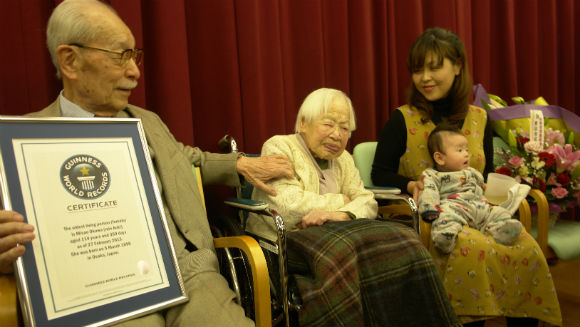Shatamanam Bhavati, says Sanskrit Hindu blessing hymn. It may come true going by the trend, say Canadian scientists. Humans, who live longer than any other species, barring trees and elephants, have many super centenarians who are crossing the 100-year-old threshold, pushing the lifespan further up.
Jeanne Calment of France who lived till she was 122 years old seeing both World Wars, Mussolini and democratic reforms later, buyoant economic growth of Italy and its underworld remains a mystery to scientists and medical community. Many Japanese women have reached nearly the same age and the clock kept on chaning faces in the last one decade.
When Canadaian Emma Morano lived up to 117 years, the researchers began to ponder if there is any end to it. Researchers from the McGill University in Canada have taken up a study of the increasing lifespan of the longest-living individuals from Japan, Italy, US, UK and France since 1968 and realised that there is no cap on how long one can live literally. Nor can there be a cap on maximum age one can live with modern medical amenities within the reach and the way Japan’s robust care for the elderly works.
“We just don’t know what the age limit might be. In fact, by extending trend lines, we can show that maximum and average lifespans, could continue to increase far into the foreseeable future,” said Siegfried Hekimi, from McGill University of Canada and the team lead.
A century ago, the average lifespan was around 60 years in developed countries while it was far below at 50 years in countries like India, bar those who practised yoga and lied on good food.
Moving forward, as of 1980, the average lifespan increased to 76 years while it is hovering around 70 years elsewhere, especially in developing countries like India. Now that the world has been shrunk to a global village, thanks to Internet, awareness is increasing, hospital care is at throwaway distance and many people have grown to be rich and educated. The lifespan average is now 82 years in Canada and around 76 years in India or other emerging economies.
However, Hekmi and his team found out that it is impossible to predict future lifespan of humans, which can move further up to a few hundred years, bringing the ancient Sanskrit blessing – Shatamanam Bhavati (Live for 1000 years) – come true. While nobody knows why the Hindu blessing of Shatamanam Bhavati was spelt out at every auspicious occasion when it was evrybody’s knowledge that one cannot live beyond 60 to 100 in ancient times too. But certainly there is an inherent meaning to its scope.
“Three hundred years ago, many people lived only short lives. If we would have told them that one day most humans might live up to 100, they would have said we were crazy,” said Hekimi. Now it is possible with the modern medical care, old age pension and other technology is there to help push the maximum lifespan of people beyond the 100 years to reach one day even 1000 years to make the Sanskrit wording “Shatamanam Bhavati” come true.
The research of Hekmi was published in the journal Nature.

